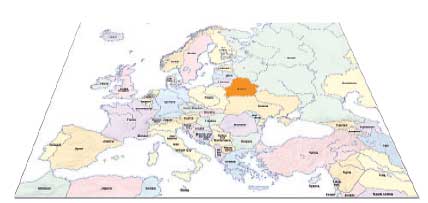By Inessa Pleskachevskaya
I’ve recently been to an international conference, dedicated to the EU’s Eastern Partnership programme, where Professor of the Moscow State Institute of International Relations, Andrey Zubov, read a solid lecture to his colleagues (most of whom were representatives of the countries that appeared after the collapse of the Soviet Union, so were primarily familiar with our common, i.e. Russian, history) on the topic whether Russia is a part of Europe. The question itself seems absurd, yet this issue has been discussed many times. I’ll also remind that no one has an idea to discuss whether Belarus is a European country. I’ve spoken with two Belarusian ambassadors — Andrei Giro in Berlin and Andrei Yevdochenko in Brussels — about European Belarus, about relations between Europe and Belarus and about readiness to accept and understand. The thoughts expressed by them turned out to be so consonant and mutually complementing that I’ve risked uniting them into one article. Andrei Yevdochenko, Ambassador of Belarus to Belgium, Permanent Representative to the European Union and NATO
Andrei Yevdochenko, Ambassador of Belarus to Belgium, Permanent Representative to the European Union and NATO
Well, we have uneasy relations with the European Union. Being here as constant representative of Belarus under the EU, I had to endure a critical moment in our relations which continued for about a year and a half. I think that eventually, when emotions calmed down, normal, worthy and constructive behaviour of Belarus concerning the EU allowed us to reach a certain intermediate stage of normalisation of our relations. We have repeatedly spoken about that, in relations with the European Union we are ready to go further, as much as the EU is ready.
How much are they ready?
Unfortunately, the European Union cannot tell us today how much they are ready. That inadequacy, which exists in the policy of the European Union concerning Belarus, is obvious and notable to the whole world, except to the EU themselves. But unfortunately, big European wheels of bureaucracy are arranged in a way that when the flywheel gains speed, it is very difficult to stop it. Big efforts are needed. So, it is possible to say that Belarus is one of those extremely rare cases of unity of the European Union states in relation to one concrete country. We know the reason of that, which lies in the geopolitical interests of the EU. While Belarus does not have that pillow of safety as many other countries have. We do not have oil, gas, gold, diamonds, uranium, rare-earth metals and many other things which are the basis of EU foreign policy. But the crisis which is now developing in Ukraine, certainly, has led to a certain sobering. All understand that the development of democracy and progress is good, and nobody protests against this, including Belarus. The question is only what tools are used and how it is realised. After all, Europeans are not silly people, they see that all those revolutions which occurred in the territory of the CIS, have not led to an improvement of life of the people, to any economic breakthrough, and, to tell the truth, from a political point of view, the situation in these countries is estimated critically. Therefore, now the European Union does not have insight on many directions. Brussels newspapers, printing and electronic media contain so much criticism, something that has not been seen for the last two decades. It is true that during the last years the policy was not absolutely wise, in both many member states, and at the level of administration of the EU. And, as a matter of fact, the financial crisis has not created these problems, it only has revealed them. After all, from an economic point of view, the European Union represents a rather mixed structure today. And the countries, on macro- and micro levels, have absolutely different sore spots. Why was it difficult to them to develop (actually, they have not fully developed yet) mechanisms and instruments for overcoming the crisis; because the illnesses are different and remedies should be also different. Now there is a reconsideration of many issues of economic policy both at national level, and within the limits of the whole EU. Now, the leaders of many countries declare that the policy of economic toughening is not the remedy which will remove Europe from systemic crisis. However, it is necessary to allow for that these statements were made during the elections in May. The question is whether it will be embodied in the strategy and programme of the EU or not. Of course, there are a lot of questions on European foreign policy. We have the Ukrainian crisis and a set of other issues. In the EU, there are a lot of people who consider that pressure and sanctions can bring results in foreign policy.
However experience shows that it is not so.
Exactly! Finally, all of us are responsible for a uniform Europe, for its safety and prosperity. We simply do not have other options than to co-operate with each other. For example, I am deeply convinced that in ten, or maybe, twenty years’ time, we will have an integration of integrations and those who will do it will be bewildered, recollecting those sceptics who say today that it cannot be, because it can never be at all.
As experience shows, nothing is impossible in politics and diplomacy. There is only the proper or improper time.
Oliver Kaczmarek, Deputy of the Bundestag from the Social Democratic Party of Germany and Head of the German-Belarusian Parliamentary Friendship Group said, “We want open and fair dialogue on the political situation in Europe, in Belarus, on prospects of the development of Belarus/Europe and Belarus/Germany relations without any prejudices. We will give all-round support to representatives of civil society in Germany who co-operate with Belarus in various fields, first of all in the field of non-governmental organisations and Chernobyl aid. Thus we will promote the development of our relations.” Is the ice broken? Andrei Giro, Ambassador of Belarus to Germany
Andrei Giro, Ambassador of Belarus to Germany
The world is developing and nothing is standing still. Those items, steps and actions which seemed correct for German policy in 2010-2011 are now seen in another light, after the events in Ukraine. In 2011, Germany introduced sanctions, including economic sanctions against Belarus. Taking into account the role of Germany in the European Union and on the worldwide political stage, it’s clear that if Germany hadn’t promoted these ideas so actively, they probably would not have been implemented.
Meanwhile, in the course of time, everyone began to understand that the situation in Belarus is far from the picture which sometimes appears in the media or in the stories of our fellow countrymen who consider themselves part of the opposition movement and who are pleased to visit European capitals and carry the only truth that, from their point of view, should be known by European public. We didn’t sit idle and also organised information events and trips, as well as trips for journalists and entrepreneurs, encouraging them to look at the situation and make their own conclusions.
The absurdity of the situation became apparent just recently when Belarus received restrictions for its consistent domestic policy in the form of sanctions which cover almost 240 people. Under the conditions of current opposition regarding the Ukrainian issue, sanctions were introduced against several dozen Russian citizens. The absurdity of the situation is evident, but the bureaucratic system in the EU is such that much time and consensus is needed in order to make a decision, while no less time and consensus is necessary to abolish it. In order to launch this project, an initiative is needed that some country, or better still a group of countries, comes up with such an initiative. One of our major tasks nowadays is to assure the leadership and government of Germany, alongside representatives of various political powers, that a policy aimed at the isolation of Belarus is non-promising, immoral and hasn’t brought the expected results, so there’s no sense to continue the pressure. All processes that are happening in our country occur in line with their internal logic, and if there are reasons for reforming some spheres of life, including the election legislation, which is often being criticised, then reforms are carried out.
Many don’t want to see or understand that, after recent presidential elections, we’ve taken almost 90 percent of recommendations and remarks of the OSCE Office for Democratic Institutions and Human Rights (ODIHR) into account. All these changes have been introduced into our legislation, have been implemented and will be applied at the next elections. Nevertheless, there are people who think that this is little and find any reason for criticism or knocks. Many politicians, with whom we managed to communicate openly, admit that double standards do exist and the attitude towards Belarus is somehow different than that towards other countries — members of the Eastern Partnership and other states that have more important meaning for the German economy than we have.
Does it mean that we need to have more a important meaning for the German economy?
This is evident. Restraint in accepting restrictive measures against Russia is explained that German business has too big interests in Russia, where around 6,000 representations of German companies are working, and Germany now satisfies around a third of its energy needs through Russian resources. Therefore, it’s clear that it’s impossible, or very difficult, to accept overnight such overwhelming sanctions against Russia as they are against Belarus.
In any case, all sensible people admit that Belarus doesn’t pose a hazard for the European Union, and in many spheres, where co-operation isn’t politicised, this collaboration is almost exemplary. These include, e.g., collaboration in the sphere of the struggle against organised crime and our contribution to the strengthening of European security in the destruction of personnel mines and simple weapons. Of course, I should also mention our 1994 refusal to utilise nuclear weapons.

Moreover, no one abolished the Budapest Memorandum, which should guarantee sovereignty, independence and absence of sanctions and political pressure. Now, Ukraine is actively appealing to this document but without any apparent success so far. We have normal interaction in the sphere of law enforcement bodies and in the customs field, alongside environment protection, agriculture, agricultural monitoring, phytosanitary and sanitary control. There’s normal working interaction at the level of experts and understanding that Belarus, being a part of Europe and a direct neighbour of the EU, can’t be excluded from common European processes. Transport, logistics and transit are topics that can’t be successfully solved in Europe without us. Therefore, those politicians who understand this see the hopelessness of pressure and sanctions and try to now find ways to smooth them and return to normal life.
We see these signals. Probably, they are currently not so clear and strong as we would like them to be but they do exist. For example, consultations between foreign ministries haven’t been organised for several years, but this year they were carried out. We are now more actively invited to take part in international forums, sessions, congresses and symposiums which deal with issues of pan-European importance.











